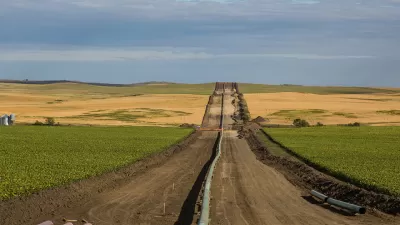With many oil pipelines stalled due to popular opposition and/or regulatory hurdles (e.g. Keystone XL and Northern Gateway, or even refineries opting for more flexibility) there seemed to be no end to the growth in moving oil by rail...until now.
Alison Sider writes that companies hoping to build rail terminals in Washington state capable of receiving the vast oil trains, also referred to as crude by rail or CBR, originating from the booming oil fields in the Bakken formation of North Dakota, are also encountering opposition.
The terminals are necessary to ship or barge the oil to refineries in Washington, Oregon, California and elsewhere, "(b)ut getting a permit in Washington is proving more challenging than companies expected." The "Lac Mégantic" effect is playing a role.
"The whole enterprise raises serious concerns about the heightened risk of transporting crude by rail," said Devorah Ancel, a staff attorney for the Sierra Club, an environmental advocacy group that has opposed some of the crude-by-rail projects at Washington ports.
There are economic advantages to building rail terminals in Washington state for receiving oil from North Dakota, now the second largest oil-producing state after Texas, producing over 1 million barrels a day (which includes neighboring states that compose the Williston Basin). It costs refiners only $10 barrel, "compared with $13 to $16 for a barrel of crude to travel by rail to California and $16 to ship a barrel to the East Coast," writes Sider.
But projects planned for some of the state's ports, where oil would be unloaded from trains, stored in tanks, and transferred to barges, have attracted criticism. A state hearing board recently overruled the City of Hoquiam, southwest of Seattle, which had issued permits to expand two terminals at the Port of Grays Harbor, west of Tacoma, to handle crude.
Pipeline projects that encountered opposition, in addition to Keystone XL, include the Northern Gateway in British Columbia, and the Freedom Pipeline from West Texas to California, which was dropped after California refineries opted to receive crude-by-rail.
However, the news is not all bad in the oil pipeline business. Keystone XL's southern leg, from Cushing, Okla., to the Gulf Coast at Port Arthur, Tex. will be operational on Jan. 3, reported the Huffington Post on Dec. 3.
FULL STORY: Moving Crude by Railcar Stalls on the Track

Maui's Vacation Rental Debate Turns Ugly
Verbal attacks, misinformation campaigns and fistfights plague a high-stakes debate to convert thousands of vacation rentals into long-term housing.

Planetizen Federal Action Tracker
A weekly monitor of how Trump’s orders and actions are impacting planners and planning in America.

San Francisco Suspends Traffic Calming Amidst Record Deaths
Citing “a challenging fiscal landscape,” the city will cease the program on the heels of 42 traffic deaths, including 24 pedestrians.

Bend, Oregon Zoning Reforms Prioritize Small-Scale Housing
The city altered its zoning code to allow multi-family housing and eliminated parking mandates citywide.

Amtrak Cutting Jobs, Funding to High-Speed Rail
The agency plans to cut 10 percent of its workforce and has confirmed it will not fund new high-speed rail projects.

LA Denies Basic Services to Unhoused Residents
The city has repeatedly failed to respond to requests for trash pickup at encampment sites, and eliminated a program that provided mobile showers and toilets.
Urban Design for Planners 1: Software Tools
This six-course series explores essential urban design concepts using open source software and equips planners with the tools they need to participate fully in the urban design process.
Planning for Universal Design
Learn the tools for implementing Universal Design in planning regulations.
planning NEXT
Appalachian Highlands Housing Partners
Mpact (founded as Rail~Volution)
City of Camden Redevelopment Agency
City of Astoria
City of Portland
City of Laramie



























